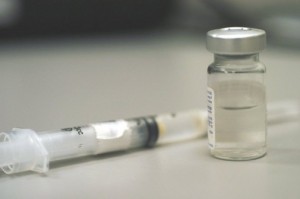U.S. Ebola Victims Responding To ‘Experimental’ Serum
By Dr. James Palermo // August 8, 2014
MEDICAL ETHICISTS: MAKE SERUM AVAILABLE TO AFRICANS
ABOVE VIDEO: CNN’s Senior Medical Correspondent, Dr. Sanjay Gupta, reports on the unknown serum that was given to two U.S. Ebola patients and likely improved their condition and probably saved their lives.
According to the World Health Organization (WHO), more than 1,700 people have been infected and more than 900 have died in the 2014 Ebola outbreak—the deadliest outbreak of the virus, for which there is no vaccine and no cure, since it was first detected in 1976.
The outbreak began in Guinea in March and has since spread to nearby Liberia, Sierra Leone, and Nigeria.
AMERICAN HEALTHCARE WORKERS FIRST TO RECEIVE ANTI-EBOLA SERUM
U.S. health officials announced in August that Ebola had infected U.S. physician Kent Brantly and medical missionary Nancy Writebol, both of whom were working for Samaritan’s Purse, a non-denominational evangelical Christian International Relief organization based in Boone North Carolina.

Both Brantly’s and Writebol’s conditions were deteriorating when agents at Samaritan’s Purse asked Center for Disease Control and Prevention (CDC) officials for any treatment—tested or untested—that could help save the lives of the volunteers. The CDC put them in touch with National Institute of Health (NIH) workers in Africa where research has been ongoing in developing a serum known as ZMapp, a cocktail of antibodies that have the capability of blocking the virus.
Anthony Fauci, director of NIH’s National Institute of Allergy and Infectious Diseases told the Washington Post, “Our staff in Liberia knew about the research and flagged it for the religious groups.”
A few days later, frozen vials of the serum, which had previously only been tested on monkeys, were delivered and administered to Brantly and Writebol, whose conditions at the time were reported as “grave.”
BRANTLY AND WRITEBOL IMPROVING AT EMORY UNIVERSITY HOSPITAL
They have since been transferred from West Africa to Emory University Hospital in Atlanta, where they are being treated in a special isolation unit and appear to be improving.
Fauci is encouraged by the recovery of the two patients, but cautious, saying, “We’re hearing that the administration of this cocktail of antibodies improved both Dr. Brantly and Ms. Writebol, but you know, we don’t know that.”

Success in just two patients does not prove the serum’s effectiveness, which would require a much larger group of patients and a control group. The WHO says that for now it cannot “recommend any drug that has not gone through the normal process of licensing and clinical trials,” but is soon convening a panel of medical ethicists to review whether experimental drugs should be considered to treat more victims of the growing outbreak.
“We are in an unusual situation in this outbreak. We have a disease with a high fatality rate without any proven treatment or vaccine,” WHO assistant director-general Marie-Paule Kieny said in a statement. She added, “We need to ask the medical ethicists to give us guidance on what the responsible thing to do is.”
‘DIRE CIRCUMSTANCES’ CALLING FOR BROADER USE OF EXPERIMENTAL TREATMENT
As the health of Brantly and Writebol appears to improve, Ebola experts are calling for broader use of the serum and other experimental treatments.

For some, the decision to administer the experimental drug to U.S. health workers and not to the dozens of African health workers who have contracted the disease has added to perceptions of Western insensitivity, according to the Los Angeles Times.
Last week, three medical ethicists—including Peter Piot, who co-discovered the Ebola virus and is director of the London School of Hygiene and Tropical Medicine—released a joint statement, saying, “Dire circumstances call for a more robust international response,” and that the “African countries where the current outbreaks of Ebola are occurring should have the same opportunity [for use of ‘experimental’ drug]. African governments should be allowed to make informed decisions about whether or not to use these products, for example to protect and treat health care workers who run especially high risks of infection.”
EBOLA VACCINE MAY BE AVAILABLE IN 2015
Meanwhile, U.S. officials have fast-tracked the development of an Ebola vaccine that will be tested in human trials next month. The vaccine has shown promising success in monkeys and if human trials go well, it could be available in 2015, officials say. (Dennis/Bernstein, Washington Post, 8/4; Dixon, Los Angeles Times)












